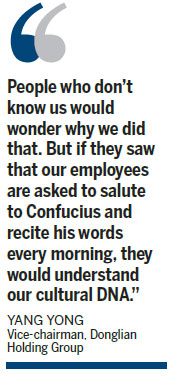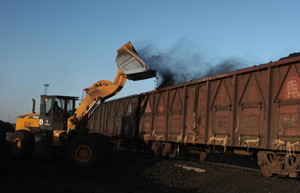Three years after the plunge in the price of coal ended the boom years for Erdos, a city in Inner Mongolia autonomous region, the aftermath could still be felt in every corner of the city: skyscrapers stood vacant and few cars waited at intersections for the traffic lights to change. The extravagance of the avant-garde buildings seemed only to serve as a reminder of those exuberant times.

The city, well-known with-in China as being a "ghost city" and a byword for "indebtedness", is much more than that. It is the location of the mausoleum of Genghis Khan. It owns well-preserved examples of the Mongol nomadic culture. It has vast grasslands as well as desert.
Donglian Holding Group, based in Erdos, aimed to make best use of these resources. It was not a sudden idea that came after the music stopped playing for the coal industry. The company had started on its alternative path well before the boom years from 2006 to 2011.
Hou Yushe, an official-turned private businessman, made his initial fortune in the housing construction sector between 1999 and 2000, when the city's property sector became commercialized. More fortune lay ahead of him as the following decade witnessed the frenetic growth of the property sector that accompanied the booming coal industry. But while most other local entrepreneurs amassed their formidable fortunes from coal and property, Hou shifted his interest to the less lucrative sectors of culture and tourism.
"He is a rarity among his peers. In many people's eyes, he lost the golden touch. I, too, think that but realize the shift required wisdom, resolve and courage," said Yang Yong, vice-chairman of Donglian.
Hou is a devoted Buddhist, and he declined to be interviewed.
Hou's shift in business interests started with the mausoleum of Genghis Khan. In 2001, Donglian invested in the State-run resort and has operated it ever since. The small town adjacent to the mausoleum, once poor and shabby, has now become beautiful and prosperous; almost every resident runs a business associated with the resort.
Donglian also built a theme park in the Subohan Prairie, which features Mongolian yurt, horse riding and traditional displays. In the summer time, visitors from the cities enjoy themselves by walking through an emerald sea of grass, looking out on vistas where the horizon meets the sky. They can also watch the ritual and ceremony of the Wedding of Erdos. When the winter falls, employees in the park devote their time to making handicrafts and preparing for the next busy season.
Since 2009, Donglian has gradually left the property and construction business, once the cash cow of the company. It has entered other areas such as cartoon films. A cartoon series promoting traditional Chinese values was developed by Donglian and aired by the State broadcaster.
"People who don't know us would wonder why we did that. But if they saw that our employees are asked to salute to Confucius and recite his words every morning, they would understand our cultural DNA," Yang said.
Donglian's ambition is much more than being a local tourism and culture company.
Donglian's model for this venture is Overseas Chinese Town Group Ltd, a Shenzhen-based conglomerate whose amusement parks, theme parks and miniaturized scenic spots have sprung up across the country.
"As large as OCT is, it could not make much money from the parks. Its major profits are derived from the surrounding hotels, restaurants and other derivative products. That's the direction for China's culture and tourism property industry," said Yang, adding Donglian is seeking to make ticket sales a minority of its revenue.
Making the nomad culture into a theme park seems an interesting idea, but unlike State-owned OCT, it is a challenge for private firm like Donglian to acquire land and secure local government support, especially outside of Inner Mongolia autonomous region, experts said. The company's predicament is illustrated by the fact that out of the 24 members of the China Tourist Attractions Association, Donglian is the only private firm.
Donglian remains undeterred by such obstacles and is seeking a listing in the National Equities Exchange and Quotations exchange, an over-the-counter market that allows investors to trade equities.
|
 |
 |
| Inner Mongolia eases rules on coal firms | 10 countries that have most nuclear power plants |
